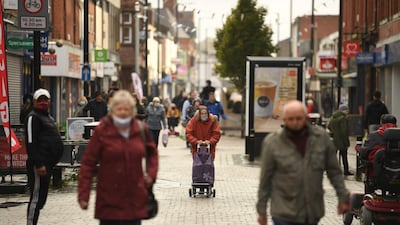UK retail sales rebounded for the fifth consecutive month in September as demand for food and household goods led to the biggest quarterly jump on record, according to official figures.
The volume of goods sold in stores and online grew 1.5 per cent from August, the Office for National Statistics said on Friday, taking total sales volumes to 5.5 per cent above their pre-pandemic level. Meanwhile, sales were 17.4 per cent higher in the third quarter ended September 30, following the lockdown-induced contraction in the previous three months.
“Food stores and online retailers have fared particularly well in recent months, and most other store types have now recovered to pre-pandemic levels too after being subject to temporary closures during restrictions in the spring,” said Jonathan Athow at the ONS.
"Clothing store sales have been slower to recover and fuel sales remain subdued as people continue to work from home and have reduced the amount they travel.”
Strong consumer demand has helped to propel Britain's recovery from the initial shock of the coronavirus lockdown, which saw output contract by 19.5 per cent in April, more than in any other major advanced economy.
Gross domestic product rose 2.1 per cent in August from July, lower than economist forecasts of 4.6 per cent, as the economy struggled to get back on its feet.
“The further rise in retail sales in September means that retail sales are now 5.5% above their pre-virus level,” said Thomas Pugh, UK economist at Capital Economics. “But total consumer spending will probably start to stutter over the next few months as the furlough scheme ends and unemployment rises, despite the increased generosity of the Job Support Scheme."
Grocery sales were 3.7 per cent higher in September than in February, despite retailers suggesting the peak would be March when panic buying saw consumers throng into supermarkets to stock up on staples.
Despite a notable fall in food sales since the peak, spending has remained high, something the ONS attributes to tightening restrictions in bars and restaurants amid a second wave of coronavirus encouraging consumers to spend more in supermarkets.
Healthy demand for DIY and electrical goods stores saw sales in household and other non-food stores surge to 11 per cent above February levels.
Fuel was one of the main sectors to fall below February’s pre-pandemic level with volume sales lower in September at 8.6 per cent due to reduced travel as many continued to work from home. Clothing sales volumes were also 12.7 per cent below February levels.
The proportion of online sales was still higher at 27.5 per cent, compared with 20.1 per cent in February.
However, increasing government movement restrictions, as the number of Covid cases rise, coupled with falling consumer sentiment, may hurt retail sales going forward.
“Ironically, more restrictions on hospitality venues may give retail sales a further boost in the months ahead as people resort to cooking at home and ordering online again,” said Mr Pugh. “But rather than indicating a robust recovery in consumer spending, a further rise in retail sales may just indicate that consumers are being forced to buy goods instead of services.”
British consumer sentiment slumped this month by the most since the start of the coronavirus pandemic, with the GfK Consumer Confidence Index tumbling to -31 in October, its lowest level since late May. It is also down sharply from a nine-month high of -25 in September.
"There's a worrying threat of a double-dip in consumer confidence as concerns for our personal financial situation and even deeper fears over the state of the UK economy drag the index down," Joe Staton, director at GfK, said.
The index showed an especially large 12-point decline in households' outlook for the economy over the next 12 months.
Polling took place in the first two weeks of October before major cities such as Manchester moved to the highest tier of the government's lockdown programme.
“We think that consumers are right to be worried,” said Mr Pugh. “The recovery will almost certainly stall in Q4 and additional Covid-19 restrictions could easily cause consumer spending to reverse some of the gains it has made since April.”
Bank of England Chief Economist Andy Haldane said on Thursday that consumer spending had been unexpectedly resilient in Britain, and noted that in the US a second wave of Covid cases had done little to dent spending there.


